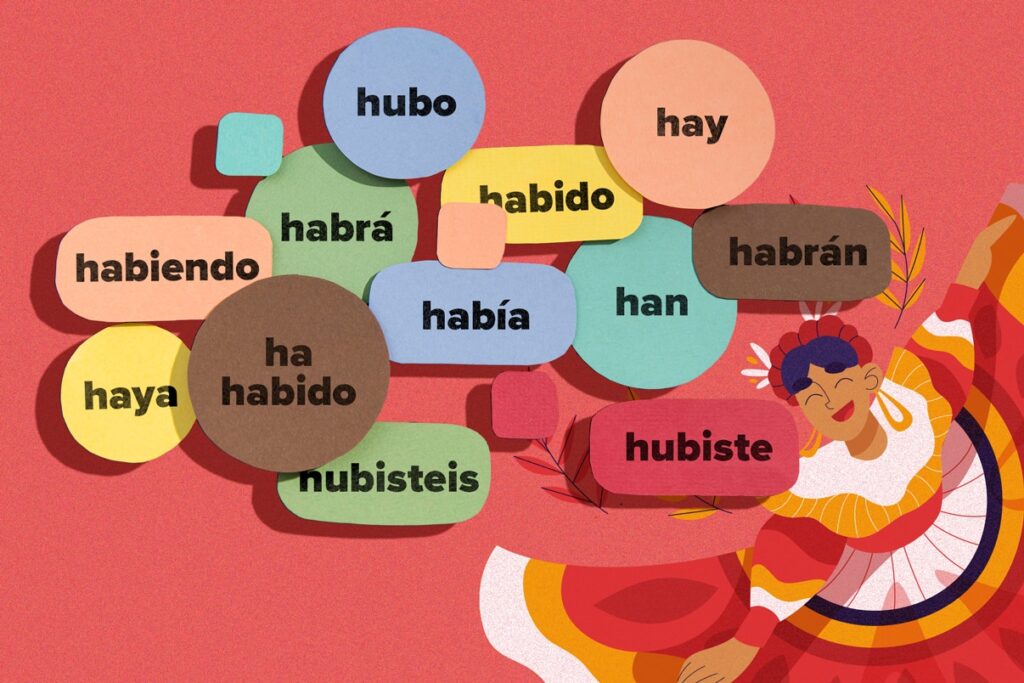How to Use “Haber” in Spanish

Haber is an auxiliary verb, which means it helps other verbs express their tense or mood.
You’ll hear it all the time in Spanish conversations, making it essential to learn.
Read on to learn how to use haber—including haber conjugations, meanings, usages and more—as an impersonal verb, an auxiliary verb and a participle.
We’ll also cover all of the haber conjugations and common expressions that use this super handy verb.
Download: This blog post is available as a convenient and portable PDF that you can take anywhere. Click here to get a copy. (Download)
Uses of Haber in Spanish
Haber can take the form of an impersonal verb, an auxiliary verb or a past participle, and can be used in the following ways:
- To indicate existence. The most basic use of haber is to indicate existence. This can be tangible, like Hay una mesa en el comedor (There is a table in the dining room). But it can also indicate something intangible, like Hay química entre nosotros (There is chemistry between us).
- To indicate a lack of existence. This is the opposite of the first usage. For example: No hay ninguna cama en la cocina (There isn’t any bed in the kitchen). You can also use it to ask if something exists: ¿Hay velas? (Are there any candles?).
- Shows what must be done when coupled with que. Haber que means “have to” or “must,” just like tener que. For example: Hay que tener cuidado (We/one/you/I must be careful).
- As a helping verb supporting the sentence’s main verb. In this function, haber and its companion verb express an action that has been or will be completed. It’s roughly equivalent to the English “have” or “had.” For example: Había salido (I had left).
- As a present participle. You may see it in the present participle form, which never changes: habiendo. This translates to the English “having,” like this: Habiendo cenado, Luis decidió mirar televisión (Having eaten dinner, Luis decided to watch television).
- As a past participle. You may also see haber in the past participle form, paired with its auxiliary verb form: haber + habido. For example: Ha habido muchos cambios este año (There have been a lot of changes this year.)
Haber as an Impersonal Verb
Remember that as an impersonal verb (a verb that does not have a true subject), haber indicates existence and is always conjugated in the third-person form.
Let’s look at some more examples:
No habrá posibilidad de amor en mi vida, porque Ana no me quiere más.
(There will be no chance of love in my life, because Ana doesn’t love me anymore.)
Hay demasiada tristeza en las noticias.
(There is too much sadness on the news.)
Siempre hay gente que no cree en lo verdadero.
(There are always people who don’t believe in what is true.)
Impersonal Haber Conjugations in the Indicative
The indicative mood discusses facts—things that have happened, are happening or will happen.
Haber is conjugated in the indicative mood when it’s used as an impersonal verb. So it will take on one of these indicative tenses:
| Tense | Spanish | English |
|---|---|---|
| Present | Hay | There is/are |
| Imperfect | Había | There was/were |
| Preterite | Hubo | There was/were |
| Future | Habrá | There will be |
| Conditional | Habría | There would be |
| Present Perfect | Ha habido | There has/have been |
| Pluperfect | Había habido | There had been |
| Preterite Perfect (archaic) | Hubo habido | There had been |
| Future Perfect | Habrá habido | There will have been |
| Conditional Perfect | Habría habido | There would have been |
Impersonal Haber Conjugations in the Subjunctive
The subjunctive mood discusses opinions, perceptions, possibilities and more.
Here’s how to conjugate haber as an impersonal verb in the subjunctive mood:
| Tense | Spanish | English |
|---|---|---|
| Present | Haya | There is/are |
| Imperfect | Hubiera , Hubiese | There was/were |
| Future (archaic) | Hubiere | There would be |
| Present Perfect | Haya habido | There has/have been |
| Pluperfect | Hubiera habido , Hubiese habido | There had been |
| Future Perfect (archaic) | Hubiere habido | There will have been |
Common Expressions with Hay
Many useful phrases in Spanish use hay.
You’ll hear these quite frequently, so I suggest adding them to your flashcard decks and committing them to memory:
- Hay de todo — There’s a bit of everything
- De lo que no hay — The worst/the pits
- Aquí hay tomate / Aquí hay gato encerrado — Something’s fishy (literally: here there are tomatoes)
- A buen hambre no hay pan duro — Beggars can’t be choosers (literally: to good hunger there isn’t hard bread)
- Es lo que hay — That’s all there is
- Hay de todo como en botica — There’s a wide range/there’s a bit of everything (literally: there’s everything like in the pharmacy)
- Hay más tiempo que vida — There’s all the time in the world (literally: there’s more time than life)
There are tons more expressions where you’ll encounter hay (or other forms of haber), but this list is enough to get you started.
Once you’ve committed these to memory though, I highly recommend searching for more the next time you chat with a native speaker or watch Spanish content. Programs like FluentU make this even easier since interactive subtitles are added to every video.
FluentU takes authentic videos—like music videos, movie trailers, news and inspiring talks—and turns them into personalized language learning lessons.
You can try FluentU for free for 2 weeks. Check out the website or download the iOS app or Android app.
P.S. Click here to take advantage of our current sale! (Expires at the end of this month)

Haber as an Auxiliary Verb
When haber is used as an auxiliary verb, it is paired with another verb in the past participle form (ending with –ado or –ido) to talk about actions that have been or will be completed.
For example:
Han estudiado durante tres horas hoy.
(They have studied for three hours today.)
Mateo e Isabella habrán estado casados dos años este mes.
(Mateo and Isabella will have been married for two years this month.)
Auxiliary Haber Conjugations in the Indicative
In the indicative mood, you’ll see these forms of the auxiliary verb haber:
| Present | Imperfect | Preterite | Future | Conditional |
|---|---|---|---|---|
| He
I have | Había
I used to have | Hube
I had | Habré
I will have | Habría
I would have |
| Has
You have | Habías
You used to have | Hubiste
You had | Habrás
You will have | Habrías
You would have |
| Ha
He/she has You (formal) have | Había
He/she/you used to have | Hubo
He/she/you had | Habrá
He/she/you will have | Habría
He/she/you would have |
| Hemos
We have | Habíamos
We used to have | Hubimos
We had | Habremos
We will have | Habríamos
We would have |
| Habéis
You (plural) have | Habíais
You used to have | Hubisteis
You had | Habréis
You will have | Habríais
You would have |
| Han
They/you (formal, plural) have | Habían
They/you used to have | Hubieron
They/you had | Habrán
They/you will have | Habrían
They/you would have |
Haber as a Participle
You may also see haber in the past participle form, paired with its auxiliary verb form: haber + habido.
For example:
Ha habido muchos cambios este año.
(There have been a lot of changes this year.)
| Tense | Spanish | English |
|---|---|---|
| Present Perfect | Ha habido | There has/have been |
| Pluperfect | Había habido | There had been |
| Preterite Perfect (archaic) | Hubo habido | There had been |
| Future Perfect | Habrá habido | There will have been |
| Conditional Perfect | Habría habido | There would have been |
Participle Haber Conjugations in the Subjunctive
In the subjunctive mood, haber conjugates like this alongside the past participle form of another verb:
| Present | Imperfect | Future (archaic) |
|---|---|---|
| Haya
I have | Hubiera
, Hubiese
I had | Hubiere
I will have |
| Hayas
You have | Hubieras
, Hubieses
You had | Hubieres
You will have |
| Haya
He/she/you (formal) have | Hubiera
, Hubiese
He/she/you had | Hubiere
He/she/you will have |
| Hayamos
We have | Hubiéramos
, Hubiésemos
We had | Hubiéremos
We will have |
| Hayáis
You (plural) have | Hubierais
, Hubieseis
You had | Hubiereis
You will have |
| Hayan
They/you (formal, plural) have | Hubieran
, Hubiesen
They/you had | Hubieren
They/you will have |
Just like the perfect tenses in the indicative mood, you’ll only ever use haber + habido in the third-person singular form.
| Tense | Spanish | English |
|---|---|---|
| Present Perfect | Haya habido | There has/have been |
| Pluperfect | Hubiera habido | There had been |
| Future Perfect (archaic) | Hubiere habido | There would have been |
Haber Practice Quiz: Test Yourself!
So, what’s there in your dining room? Who is (or isn’t) there in your heart?
I think it’s your turn to practice haber conjugations now.
Download: This blog post is available as a convenient and portable PDF that you can take anywhere. Click here to get a copy. (Download)
And One More Thing…
If you've made it this far that means you probably enjoy learning Spanish with engaging material and will then love FluentU.
Other sites use scripted content. FluentU uses a natural approach that helps you ease into the Spanish language and culture over time. You’ll learn Spanish as it’s actually spoken by real people.
FluentU has a wide variety of videos, as you can see here:

FluentU brings native videos within reach with interactive transcripts. You can tap on any word to look it up instantly. Every definition has examples that have been written to help you understand how the word is used. If you see an interesting word you don’t know, you can add it to a vocab list.

Review a complete interactive transcript under the Dialogue tab, and find words and phrases listed under Vocab.

Learn all the vocabulary in any video with FluentU’s robust learning engine. Swipe left or right to see more examples of the word you’re on.

The best part is that FluentU keeps track of the vocabulary that you’re learning, and gives you extra practice with difficult words. It'll even remind you when it’s time to review what you’ve learned. Every learner has a truly personalized experience, even if they’re learning with the same video.
Start using the FluentU website on your computer or tablet or, better yet, download the FluentU app from the iTunes or Google Play store. Click here to take advantage of our current sale! (Expires at the end of this month.)







